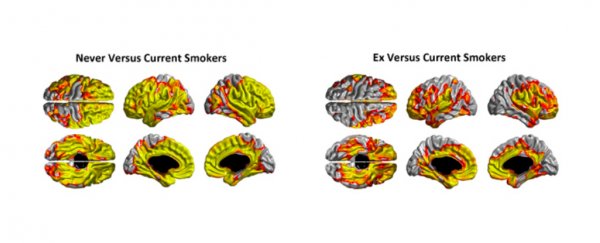Cigarettes may be damaging our brains as well as our lungs and cardiovascular systems, a new study suggests.
An analysis of 504 people has revealed that the cortex of a smoker's brain is thinner than the same region in a non smoker - as you can see in the image above, where yellow represents a large difference between thickness, and the colour gets darker orange as the gap decreases.
And that's not great, because the cortex is pretty important - it's the outer layer of the brain, and is involved in vital functions like memory, language and perception. Previous studies have shown that a thinner brain cortex is associated with cognitive decline in adults.
However, it's not all bad news - the study also found that quitting starts to partially, but very slowly, reverse the cortex damage.
"We found that current and ex-smokers had, at age 73, many areas of thinner brain cortex than those that never smoked," said lead researcher Sherif Karama, a psychiatrist from McGill University in Canada, in a press release. "Subjects who stopped smoking seem to partially recover their cortical thickness for each year without smoking."
But the damage may never be fully repaired, with the study showing that former heavy smokers who quit more than 25 years ago still have thinner cortices than people who never smoked.
This is the largest study ever conducted on cortex thickness and smoking, and it may help explain the link between cigarettes and neurological issues. Researchers already know that being a smoker increases the risk of cognitive decline and dementia, but it was unclear up until now exactly how cigarettes changed the structure of the brain.
The research involved 244 males and 260 females with an average age of 73. All of the participants had been examined in 1947 when they were children as part of the Scottish Mental Survey. And the team more recently analysed the volunteers' health, behavioural choices and also used MRI scans to study their brain cortices.
Although the cortex gradually thins as people get older, the researchers found that smoking appeared to speed up this process. Even after adjusting for lifestyle factors such as sex and age, current and ex-smokers had significantly thinner regions in their cortices than people who had never smoked. The results have been published in Molecular Psychiatry.
"Smokers should be informed that cigarettes could hasten the thinning of the brain's cortex, which could lead to cognitive deterioration," said Karama in the release.
And even though the research shows that quitting is good, not starting in the first place is even better. "Cortical thinning seems to persist for many years after someone stops smoking," Karama added.
